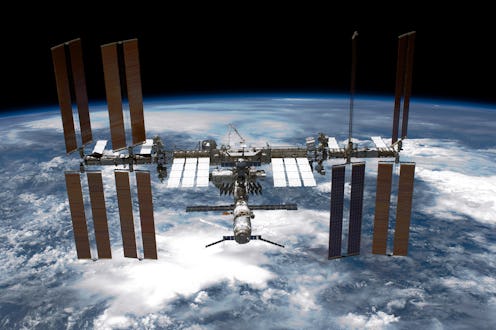News
One Good Thing Came Out Of ISS Leak Scare
The crew on board the International Space Station just had a pretty major scare. Early Wednesday morning, Russian news agencies started reporting a toxic ammonia leak in the U.S. section of the ISS that forced the crew stationed there to evacuate to the Russian section and stay overnight. No crew members were injured or harmed. Good news came hours later when Mission Control informed them that the leak appeared to be a false alarm caused by a "faulty sensor or computer relay."
At 3:44 a.m., a leak of "harmful substances" from the station's cooling system was detected in the United States' segment, the Russian Federal Space Agency posted on its website. Russian news agency Interfax reported it to be an ammonia leak. The crew in the U.S. section immediately put on masks and began moving to the Russian side, closing hatches and sealing the U.S. segment behind them. The astronauts in the Russian segment invited the crew from the American module to bunk with them overnight.
Maxim Matyushin, head of the Russian mission control center, said in a statement:
The crew's safety has been achieved through the coordinated and expedient actions of the cosmonauts and astronauts, as well as the mission control teams in Moscow and in Houston.
The ISS crew is currently made up of six astronauts: U.S. astronaut Commander Barry Wilmore; Russian cosmonauts engineers Aleksandr Samokutyaev and Elena Serova, the first Russian female cosmonaut in 17 years; American astronaut Commander Terry Virts; Italy’s onboard engineer Samantha Cristoforetti; and Russian cosmonaut engineer Anton Shkaplerov.
Later on, after both U.S. and Russian Mission Control assessed the situation, NASA confirmed that there was no ammonia leak and that the crew had responded to coolant loop pressure increases.
There was a reason why the crew acted so quickly and knew exactly what to do. Former ISS astronaut Chris Hadfield tweeted that coolant leaks are one of three major emergencies that astronauts onboard the ISS prepare for.
In fact, this isn't the first time the crew of the ISS was faced with the alarm of an ammonia leak. In 2001, two NASA astronauts on the ISS were connecting cooling lines when a defective valve allowed 5 percent of ammonia to leak into space. No crew members were injured. In 2013, another ammonia leak forced two astronauts to complete a spacewalk to replace a pump controller box. The recent incident will likely require crew members to do the same, said Mission Control, despite being a false alarm.
The teamwork and camaraderie exhibited between the Russian and American astronauts during this incident is indicative of a tension-free zone. However, the ISS has been used as an outer-space chess piece as events played out on Earth.
When U.S.-Russia relations soured in the wake of Russia's annexation of Crimea and NATO's sanctions on Russia in response, Putin threatened to ban the U.S. from using its shuttles to reach the ISS. Last May, Russia's deputy prime minister Dmitry Rogozin announced in a press conference that Russia would abandon its role in the ISS project when the current agreement expires in 2020. He told reporters:
We are very concerned about continuing to develop high-tech projects with such an unreliable partner as the United States, which politicises everything.
The United States has relied on Russian shuttle services to transport astronauts to the station since the U.S.'s space shuttle program was canceled in 2011. Currently, the U.S. pays $70 million for each astronaut Russia shuttles to the ISS and will continue to do so until 2017, when the United States develops its own launch services.
However, U.S.-Russia relations onboard the ISS have both literally and figuratively been miles away from the ongoing political tension. NASA Chief Charlie Bolden pointed out last March that it would take more than an international crisis to thwart the ISS's mission. He told Space.com:
I think people lose track of the fact that we have occupied the International Space Station now for 13 consecutive years uninterrupted, and that has been through multiple international crises. ... It has continued to exist and continued to function with people from a variety of cultures and beliefs, but we all are focused on the mission of the International Space Station.
Images: Getty Images (4)
